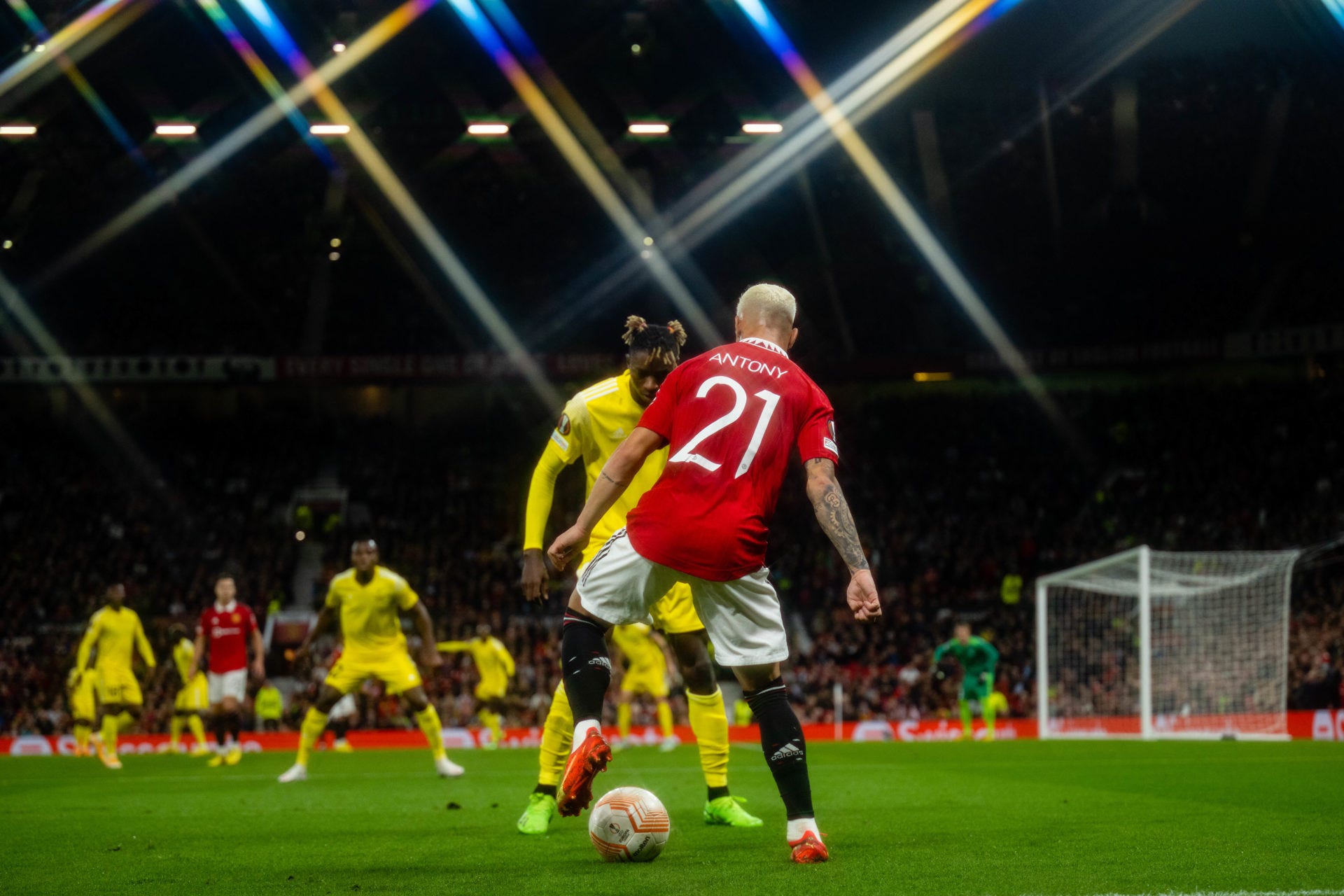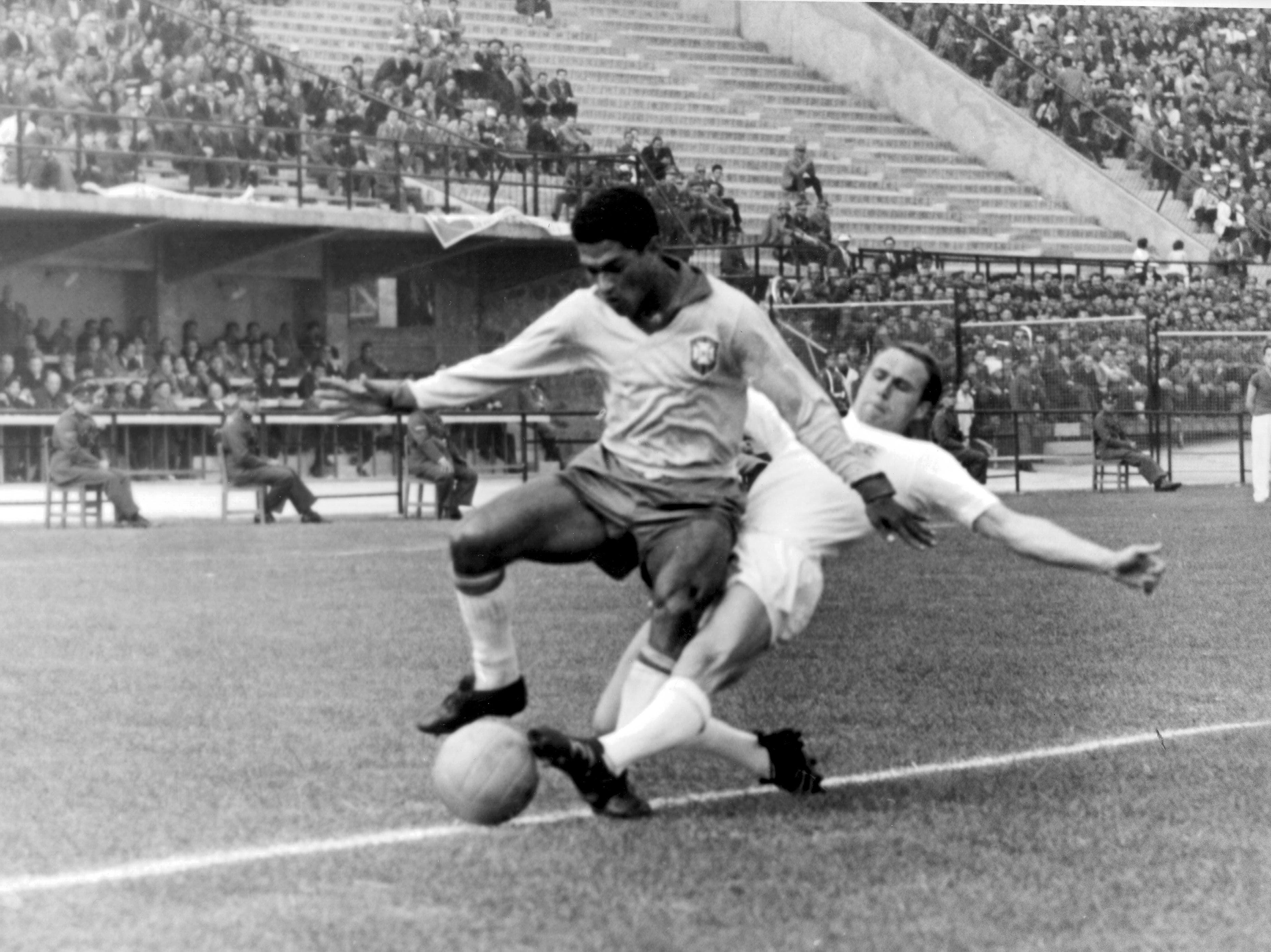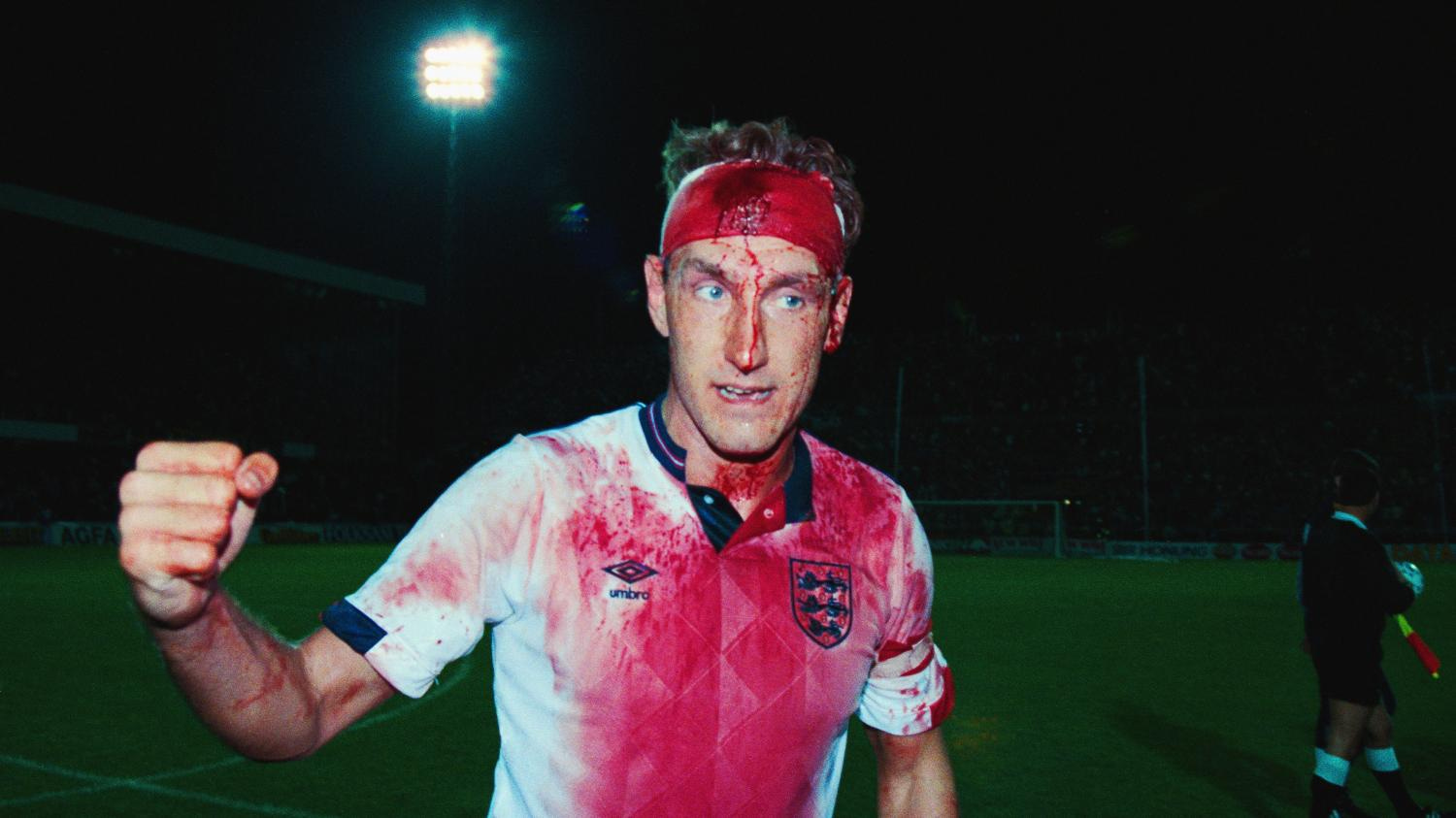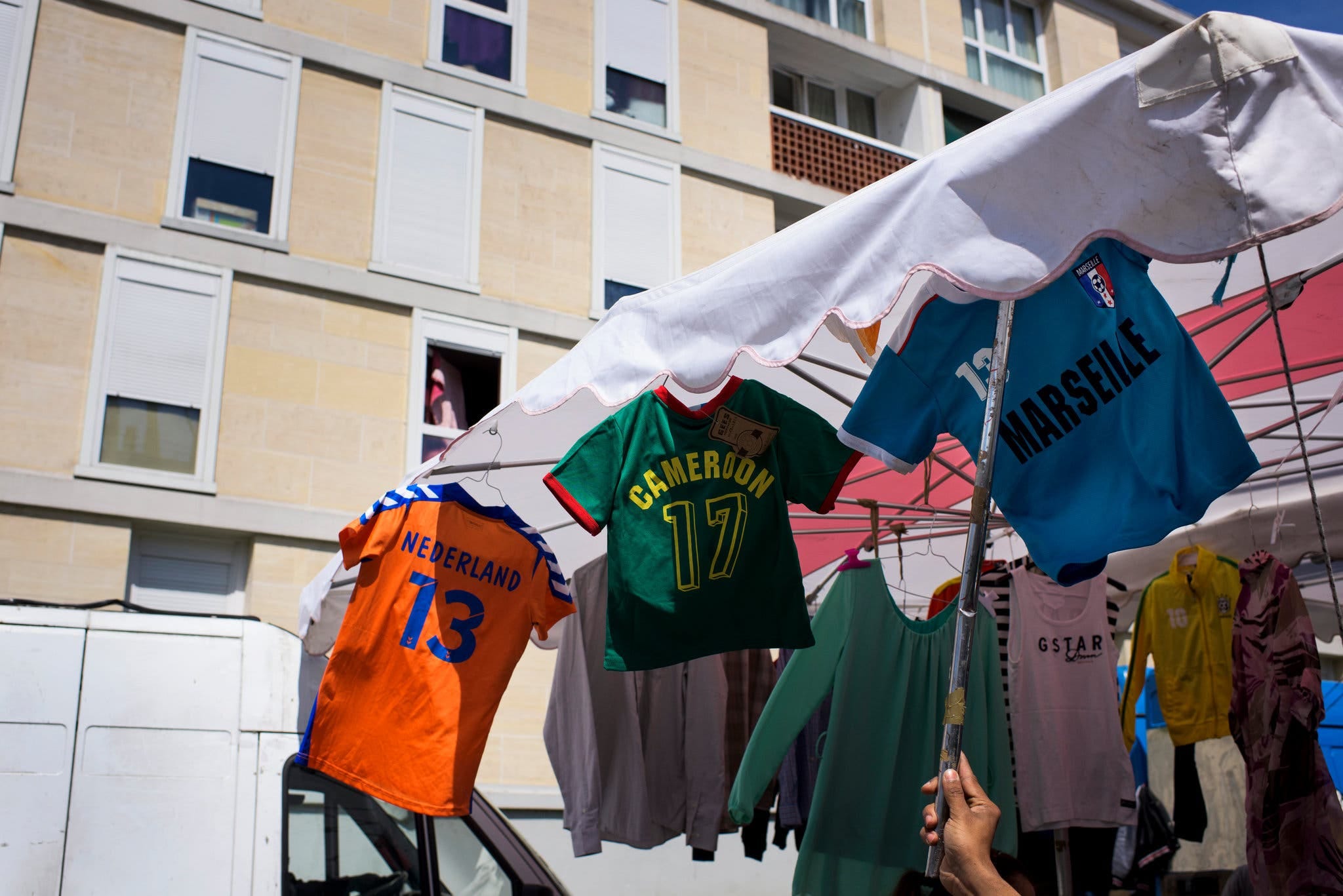In Defence of Antony's Spins
The lessons England, as a society and footballing nation, can take from everything Antony's spin symbolises.
Until this Thursday, I wasn’t hyperaware of this divide that exists in how people, in England at least, consume football.
I knew there was a difference. I guess the light bulb moment for me was just how big a difference that was. After all, the universality of football is a truth that has been echoed for as long as I can remember. This round ball is the mutual friend, introducing strangers to each other, irrespective of language or location. Only in this metaphor, friend A and friend B, despite both being friends with the same friend C, experience their friendship with friend C in wholly different ways.
As the clock rolled into the 37th minute, Antony received a pass on his favoured right flank and in one fluid touch welcomed the ball, making two revolutions, before playing an overhit through ball into space that had opened up as he spun.
That’s all that happened. For completeness, I’ll add paint to the outline. It was a home game, at the Theatre of Dreams, in a Europa League group stage fixture against Sheriff Tiraspol, a Moldovan side. The score at this point, 0-0.
That’s it. The final whistle blew on an imposing, charismatic Manchester United performance, with goals coming from Dalot, Rashford and Cristiano.
The discussions as the players departed the field have bled into the next few days, with little concern for the great football on display.
Instead, many of the loud footballing voices of ‘authority’ in England have, in unison, been incredibly critical of Antony’s footballing expression.
Robbie Savage recoiled immediately, as he commentated the game. Manchester United legend Paul Scholes echoed the very sentiment, proclaiming he didn’t want to see something like that, and wondered if anybody in the world would want to see something like that. (They would).
“I just don’t know what it achieves,” Scholes pondered.
The football analyst (the adult) in me, and the football purist (the child) in me would both justify it in various ways.
In the most traditional on-pitch sense, the space into which Antony does attempt his pass opens up after the two spins. The imperfect pass execution may warrant critique but that’s a separate thing.
The Spanish have a phrase ‘la pausa’ meaning ‘the pause’ which is an ability to slow down the pace of the game, waiting as the perfect moment to pass the ball presents itself. It’s probably unlikely Antony’s skill was consciously done for this purpose, but it was a welcomed, functional side-effect.
Aside from considering efficiency of a skill on the pitch, a move like that cannot be truly appreciated without an appreciation for the intangibles in football.
The roar of the crowd as Antony completes his spin is a momentum-shifter, more so in a stadium as grand as a packed Old Trafford. There’s this palpable excitement and growing bravado that is transmitted by both player and stadium. Your side lean forward, on the front foot, with belief and their chest puffed out.
You get the same feeling when your keeper bats away the opponent’s penalty attempt, jubilation as the team parade keeper in gratitude. You get the same feeling when an academy graduate makes a crunching slide tackle in a derby match. You get the same feeling when a long shot arrows for the top corner from 35 yards out, before being parried over — a collective ‘ooooh’, followed by applause.
None of those things result in goals directly, but the life it breathes into the stadium shrinks the opposition. Something like a signature skill move, as long as it doesn’t become overdone to the point of losing its novelty, brings about those feelings and in a far less risky manner than saving a penalty or shooting from 35 yards. It’s exciting.
The showboater’s game antagonises the opponent. It distracts, humiliates and belittles them. Does that not affect their game? Functionally, Antony is the matador waving the red cape for the opposition who, given enough provocation, charges as the bull. It’s a weaknesses that is extracted. I can’t recall a better example in sport than the Ali shuffle: a crowd-pleasing momentum-shifter, an antagonising bait, and a distraction.
Garrincha was one of Brazil’s all-time great players and a genius dribbler, who was once described as a player that, when in form, would turn the pitch into a circus. The ball would become his obedient pet, and the game became an invitation to party.
Acts of showmanship turn 80,000 spectators into 80,000 party-goers. Reflecting on the solitude of pandemic-effected stadiums, former Manchester United boss Ole Gunnar Solskjaer said, ‘home and away is not like it used to be. It’s a different sensation now playing without the fans behind the goal at the Stretford End — they normally score a goal for us.'
Isn’t that telling?
To appease the fans is of function in and of itself and Ole describes that need to appreciate the intangibles for their value in altering game outcomes.
Football is stitched into our society’s fabric in a way that makes it impossible to detach from conversations about philosophy and culture. Bielsa, former Leeds United coach and legend of the beautiful game, believes in an obligation to play ‘beautiful’, alongside the only other obligation — ‘to win’, and his justification for this reflects his numerous years breathing and obsessing over football.
‘The poorest people only have football. The rest of us have alternatives in recreation. It is hard for me to think that we are only going to offer them results.’
What somebody’s definition of ‘beautiful’ or desirable football is — is something subjective, and informed by their lived experiences. It would be against the definition of beauty to try and convince you of a singular definition of what beautiful football is. I can only offer a counter-view and defence to suggest why expression in Antony’s way matters.
‘From my point of view, what's beautiful in the sport is something you don't need to know too much about tactics or anything to see. If you find something beautiful, you don't need to be an expert to know it. It's like ballet’ — Pele.
England’s game has historically been one of physicality and no-nonsense, sitting on pillars of hard-work. Terry Butcher and his blood-drenched bandage is an image that epitomises that, and it reflects many of the most cherished values of traditional British society.
England has previously married itself with a hierarchy, an admiration for the monarchy who carry themselves as a focal point for the nation’s identity to be built upon. Stability, continuity, and properness have made up the cape England has worn. At the summit of English society is this almost mechanical properness.
There is an unwavering celebration of hard-work, and hard-work at the level of each individual. For the footballer, there’s an obsession with how far the midfielder has run, more-so than when or where they have made those runs.
Perhaps this is born out of England as a traditionally Christian country, that adopted this Protestant work ethic which subsequently permeated through into secular England’s work habits. Perhaps the political ideologies of England that have moved towards a capitalism, where every individual is more and more responsible for themselves as individuals, has cemented this need to work extremely hard to thrive (and in many cases, simply survive).
For a society built in this way, tireless hard-work is something relatable because it is how the people live. It makes complete sense why a long-hour labourer, on their off-day with football as their only outlet, would feel a great annoyance seeing the millionaire footballer put in anything less than a real shift.
Extravagance, flamboyance, play — these are ideas that parade on the opposite end of the spectrum, far less celebrated by traditional England.
Stoicism and the stiff upper lip rose to prominence as traits of Britain through the 19th and 20th century and a reluctance to display emotion is a quality British society has held in high esteem, associating it with elevated status, for decades gone by. The English align themselves with reservation, an identity of politeness, and a need not to offend.
The Brazilians contrarily play whilst they work, and work whilst they play, with a vibrance evident in their music and dance. In fact, in the 1950s, Brazil’s traditional genre of football of football was termed ginga — a word that roughly translated to ‘sway’. This ginga that radiates through the Brazilian footballer is a word that has origins in capoeriea, an acrobatic martial art-dance form that was the result of enslaved Africans and indigenous Brazilians coinciding in the 16th century, as well as samba dance.
‘We would say, "We want to dance. We want to ginga. Football is not about fighting to the death. You have to play beautifully." And so we did, and that's the reason that Brazil created more of a show, more of a ballet, than the European style.’ — Pele
And Antony sees it in the same was as his country’s greatest player did 60-odd years ago.
‘We’re known for our art’.
The questions asked of Antony post-game, that focus particularly on outcome on-field, therefore, I feel are misplaced.
‘Was it relevant? Was it needed?’ asks Ian Holloway. ‘It’s disrespectful, I don’t know what he’s thinking. It’s silly, grow up a bit.’
Answers to questions about the function of dance or ballet, as Pele mentions, shine more light on why Antony’s expression is needed.
The intention behind this piece isn’t meant to be ‘England, reserved, bad. Brazil, expressive, good’. Lots of the aforementioned parts that make up England’s jigsaw are extremely admirable qualities if that wasn’t already made clear.
There is incredible nuance to this conversation, and the piece is littered with the use of ‘perhaps’. I don’t have all of the answers but there’s ultimately utility in exposing people to the unfamiliar in a way that’ll hopefully spark conversation and reflection.
The TalkSport pundits, (Gabby Agbonlahor, Robbie Savage, Jim White etc.) alongside Ian Holloway and Paul Scholes were some of the vocal critics whilst the younger generation, pretty unanimously, loved it. Sure, not everybody English, 40 and above had a problem with it — Gary Lineker, for example, joined young Reece (see below) in his support for Antony’s skills, but it does feel like criticism and praise are divided in some way culturally.
Could Lineker’s lived experiences, as a Barcelona player, and exposure to other footballing cultures have contributed to an openness to this type of footballing expression? Maybe, it’s speculation but what is certain is that England now stand at crossroads.
England is a country, and a footballing landscape, that looks far more diverse now than it ever has done, bringing with it a new mix of influences and values. There is a cultural tug of war between wanting to be proud and connected to a long-standing identity whilst coming to terms with new influences that now populate the scene.
France’s 1998 World Cup winning side was deemed Génération Black, Blanc, Beur by their national press following the tournament — a play on the tricolours of their flag meaning black, white and Arab.
Zidane, the country’s star and son of Algerian parents, felt the slogan was nothing but a mere catchy, media invention intended to suggest a racial cohesion throughout society, which was dishonest to everyday France. France’s World Cup victory however, was the product of a multi-cultural unit that found a cohesion irrespective of racial or economic boundaries. Zidane of Algerian heritage, raised in the “banlieues” (large city suburbs) stood amongst brothers in Senegal-born Vieira and French-born Deschamps to name a few.
“France was going through a difficult period of racism and winning the World Cup showed the world, and showed the French people who didn’t see it, that France was a multi-cultural country,” - Patrick Vieira
Society and football talk to each other but they don’t always say the same things. Utopia is for society to be a colour-blind, culture-blind conglomerate founded in love. As an ethnic minority, I’d concede that feels a way away in the understatement of the year, but having that as an aim for the world of football feels slightly more attainable.
Flair isn’t monopolised by the Brazilians. It can be harvested in the concrete pitches of France’s hoods, think Mahrez, Dembele, Ben Arfa. It can be found in Holland’s street football and futsal culture, think Danjuma or Depay. Such expressive, flair dribbling is grown in these cages, where many children of immigrants, from poorer neighbourhoods, spend hours on the playground. The concrete stadium becomes a central hub, a youth centre, a living room, and a pitch all in one.
For the poorest, ‘there is only football,’ Pogba says. ‘Whether it’s at school or outside, in the neighboorhood, everyone will play football.’ Pogba’s reflections aptly mimic the earlier Bielsa quotes, only this time from the perspective of the children of football, rather than legendary coach.
The concrete game limits time and space. Rules and formations are loose and there aren’t divisions by age. Dribbling is the soul of this alternative hyper-competitive, physical game that doesn’t resemble the formal education of academies that instead focus heavily on ‘the fundamentals.’
“In the cages, it was all about nutmegging and badding people up and taking them on. When I’m in a one-v-one situation I always try to do what I used to do in the cages and try (to) perfect it.” — Jadon Sancho.
England’s South London is the equivalent of Greater Paris’ suburbs. Whilst Greater Paris nurtured the likes of Pogba, Martial, Kante, Coman, Mbappe, and Mahrez, South London brought up the likes of Sterling, Hudson-Odoi, Sancho, Loftus-Cheek, Zaha, Smith Rowe, and Abraham.
“If you look at Jadon Sancho or Callum Hudson-Odoi, they aren’t traditionally English-style players like David Beckham or Paul Scholes. (They) have games that are more about flair. It is also very competitive in south London – there is a certain resilience that players have to have to be successful. It’s very dog eat dog.”
And Harry Hudson, former Crystal Palace academy coach, is right. Almost all of the graduates of South London’s school of concrete mentioned above are players that have been recipients of vast criticism, branded silly or wasteful, frowned upon for not matching up to the traditional archetype expected of England internationals. It’s the Antony conversation but on a national scale.
Cage footballers, dressed up in flair, are players that, at their core, possess incredible strength, in build and in mentality. The environment, in all its variety, requires the best of players to a develop a creativity that is novel and magical in terms of solution-finding.
England have failed to best utilise their flair (creative) players. Raheem Sterling is the talisman for the art form and even he adapted his game into a less expressive, more choreographed one for the sake of traditional effectiveness in Guardiola’s vision. The heroic Euro 2020 campaign and his more expressive game of unique solutions pre-Manchester City is film to watch fondly. England can make better use of this special quality, whether in Raheem, Hudson-Odoi, Sancho or others.
Returning to the crossroads we stand at, England now have an opportunity to build a side in the image of this newer, diverse England or remain rigid to its traditional image, closer to the deep 5 at the back, defence-first, battling system exercised in the Euro 2020 final.
England’s melting pot contains the same ingredients France’s side did before both their World Cup wins were achieved. And like France, abiding by that recipe of a multi-cultural footballing identity, may not create perfect, tolerant harmony at the level of society, but football can be a good starting point.
Why shouldn’t we seek to best use the unique talents of South London? Is it out of fear of change, and an unfamiliarity in profile? Progression comes with change.
England is a new home to introduced cultures, religions, and races with football being a stage for the aforementioned to be displayed. An acceptance of flair, art, showmanship, and expression in Antony’s spin is to accept and appreciate the upbringing and story of players like Antony of Brazil, of players like Dembele of France and of players like Jadon Sancho of Manchester United.
I say, let the children play.
‘Your national football has to be identified by the culture of the football and the quality of your education, not where people come from’.









